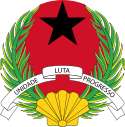 |
|---|
The politics of Guinea-Bissau take place in a framework of a semi-presidential representative democratic republic, with a multi-party system, wherein the President is head of state and the Prime Minister is head of government. Executive power is exercised by the government. Legislative power is vested in both the government and the National People's Assembly.
Since 1994, the Bissau-Guinean party system has been dominated by the socialist African Independence Party of Guinea and Cape Verde and the Party for Social Renewal. The judiciary is independent of the executive and the legislature.
Despite the democratic, constitutional framework, the military has exercised substantial power, and has interfered repeatedly in civilian leadership since multi-party elections were instituted in 1994. In the past 16 years, Guinea-Bissau has experienced two coups, a civil war, an attempted coup, and a presidential assassination by the military. Since the country's independence in 1974, only one president successfully completed his five-year term, José Mário Vaz.[1]
- ^ "Africa :: Guinea-Bissau — The World Factbook - Central Intelligence Agency". Cia.gov. Retrieved 10 August 2019.